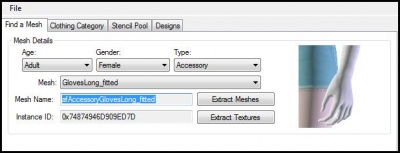Difference between revisions of "Sims 3:Replacing Textures"
(→What Do I Need?) |
(→Step 2) |
||
| Line 14: | Line 14: | ||
====Step 2==== | ====Step 2==== | ||
| − | In the "Find A Mesh" tab, set the mesh details to the parameters of the mesh you wish to change the | + | In the "Find A Mesh" tab, set the mesh details to the parameters of the mesh you wish to change the texture of. (i.e. Adult-Female-Accessory) Next choose the mesh you want to use from the drop down list. |
[[Image:Step2basetext.jpg|center|400px]] | [[Image:Step2basetext.jpg|center|400px]] | ||
Revision as of 00:00, 2 August 2009
Contents |
Introduction
This tutorial explains how to replace a CAS part texture (i.e. base texture, mask, specular) using the CAS Texture Unitool (CTU).
What Do I Need?
- Delphy's CAS Texture Unitool (CTU) found here
- A previously completed texture saved in an acceptable .DDS compression (DXT5).
How Do I Do It?
Step 1
Open the CTU and create a new file (File → New)
Step 2
In the "Find A Mesh" tab, set the mesh details to the parameters of the mesh you wish to change the texture of. (i.e. Adult-Female-Accessory) Next choose the mesh you want to use from the drop down list.
Step 3
Move over to the "Designs" tab and click "Add New Design".
Step 4
Under the "Other Details" sub-tab click the texture key to highlight it.
Step 5
Being sure that the correct texture key is highlighted, click "replace". Select your new texture file and click Open. (Notice that the texture key changes) Next hit "Commit".
Step 6
Make any other changes/additions to your package (if you don't have any, that's okay). Once you've finished, save your creation as a .package. Go to File → Save As, give your package a name, then hit save.
And that's it!


